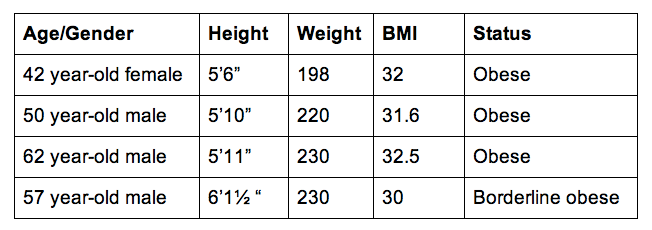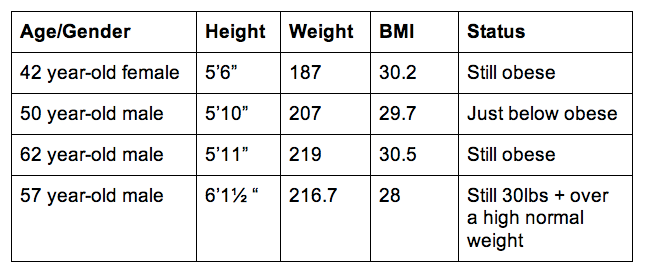Do the Diabetes Math
A new article came out saying that interventions on diabetics hadn't worked in reducing deaths from heart disease in obese people. The article also said that the interventions had lowered weight, on average, by about 6 percent. Naturally, I'm inclined to see how the math pans out. Let's consider some typical obese profiles:

Now, these aren't even the profiles of the morbidly obese, just the 33 percent of us who are obese. I should know, I was one of these people on Feb. 8, 2013. I'm the 57-year-old guy, and according to my Fitbit, I was about 230 pounds and 6 feet, 1.5 inches tall, which made me just about a BMI of 30. The article says that these folks lost 6 percent on average. Let's look at the new profiles if this (losing 6 percent) happened:

In short, it isn't enough.
Now, as it turns out, 18 weeks after Feb. 8 (again according to Fitbit), I weighed about 189 lbs. My BMI was 24.6, which is considered "normal" (although still about 5-10 pounds over an ideal weight), and my body fat had dropped from 30.2 to 20.5 percent, which, for my age, is healthy. As a side effect, in just 18 weeks, my blood pressure went from 140/80-90 with meds to 117/70 without. My cholesterol went from 208 with an LDL of 131 to 163 with an LDL of 83 (healthy) and an HDL of 63 (very healthy).
What was this amazing pill I had taken? Folks, I walked about five more miles a day than I had been doing -- good for losing about three-fourths of a pound a week on average -- and I ate less. I still ate dairy and red meat, but I did have a salad with five fruits/vegetables each evening. I just ate less (about 750 calories less per day), which is good for about 1.5 pounds a week and, indeed, my weight loss has averaged about 2.25 pounds a week pretty consistently over the last 20 weeks. So in 18 weeks, I went from unhealthy -- a walking time bomb -- to healthy and fit.
Did my doctor prescribe and monitor this? He did not. They aren't paid to do this. And frankly, who wants their doctor nagging them? What drove me was wanting to be alive when I'm 90 -- to be healthy and to fit into my college jeans. There was also social competition, which was a blended mix of social advice/support/education from Keas (my company). This, in combination with the public recording of my data on Fitbit (so that my "competitors" could track my progress and I theirs), was what helped influence. I've written about how the data does not address what really impacts our overall health -- that what was needed truly was a change in behavior and the creation of meaningful, sustainable habits. This combination built 18 weeks of habit creation.
So when I hear "intervention" and I see 6 percent, it is hard to believe that there is any uncertainty here. This isn't rocket science, this is basic math and common sense. We all need BMIs in the 22-24 range to be considered healthy (unless we're the extremely rare super-athlete weight lifter) and this is going to mean, for most of us, not losing 6 percent but more like 18 percent.
Why wasn't this the goal of the interventions? Do the math, doctors!
For more by Adam Bosworth, click here.
For more on obesity, click here.
-
Finding Weight Loss Difficult? Try These Tips!
If you aren’t sure how to effective lose weight, it can be
-
How The Dr Atkins Diet Plan Works
The Dr. Atkins diet plan is one of the most popular weight loss method
-
Laser Fat Removal
Workout can only do so much to reduce fat on trouble spots. Laser
-
Researchers Prove That Diet And Exercise Is The Best Way To Lose Weight
I am not really convinced that thus is the most ground breaking
-
How To Choose The Best Weight Loss Program In The Northwest Suburbs Of Chicago, Il
Weight loss programs have become more popular over the past few years
-
Developing Nuclear Power As Alternative Energy
Many researchers believe that harnessing the power of the atom in fis
- DON'T MISS
- Side-effects of Weight Loss Supplements
- Here Is How To Lose Belly Flab
- Helpful Weight Loss Tips for Teens
- Some Useful Tips To Select The Right Diet Plan
- The Advantages of Protein Shakes
- 3 Weight Loss Help Tips You Should Know About
- Make Any Diet 5 Times More Effective
- How Much Sugar in Popular Snack Items?
- Weight Loss For Good If Only You Had Known
- Yes, You Can Eat Carbs & Lose Weight. Heres How




